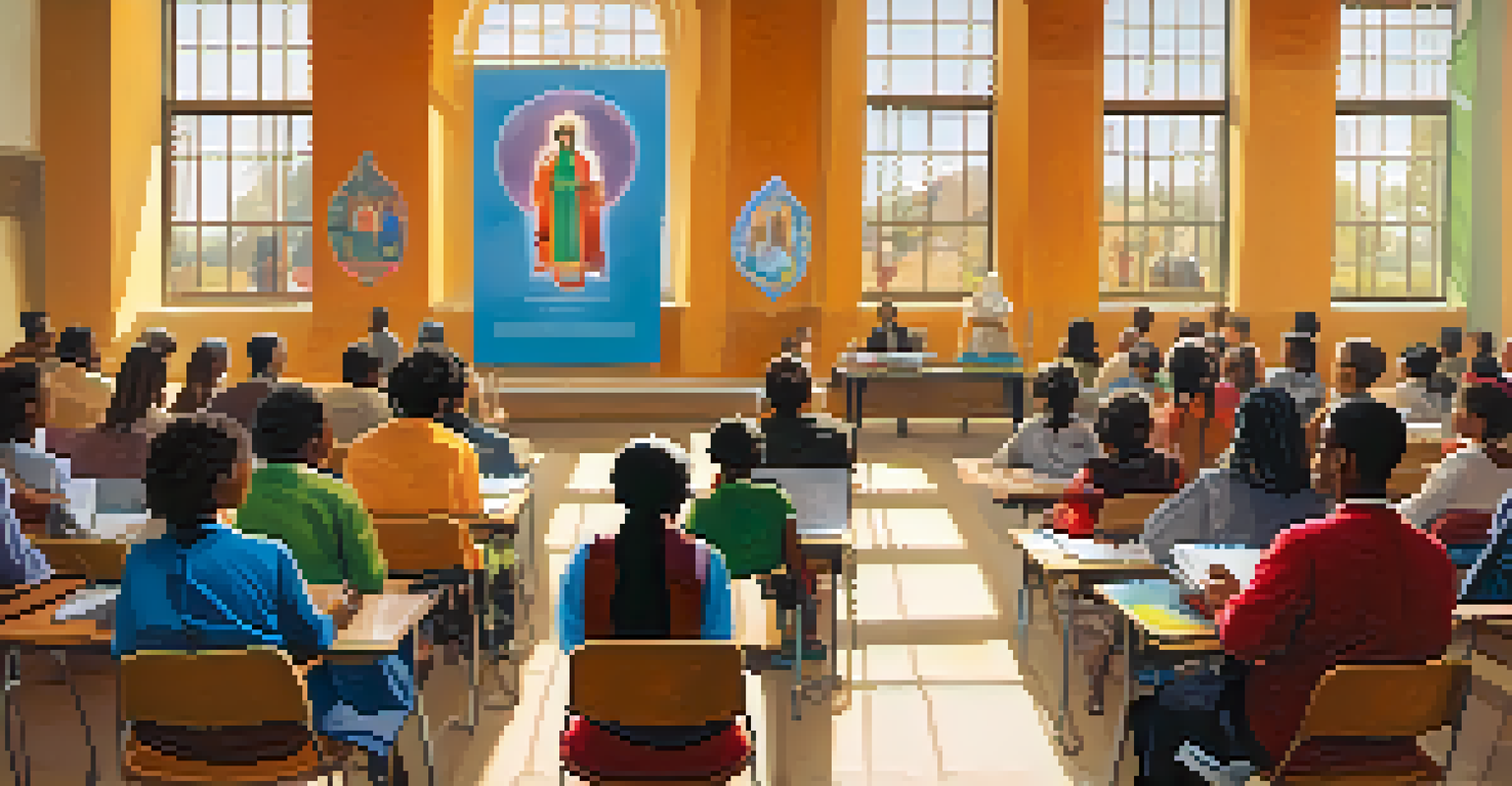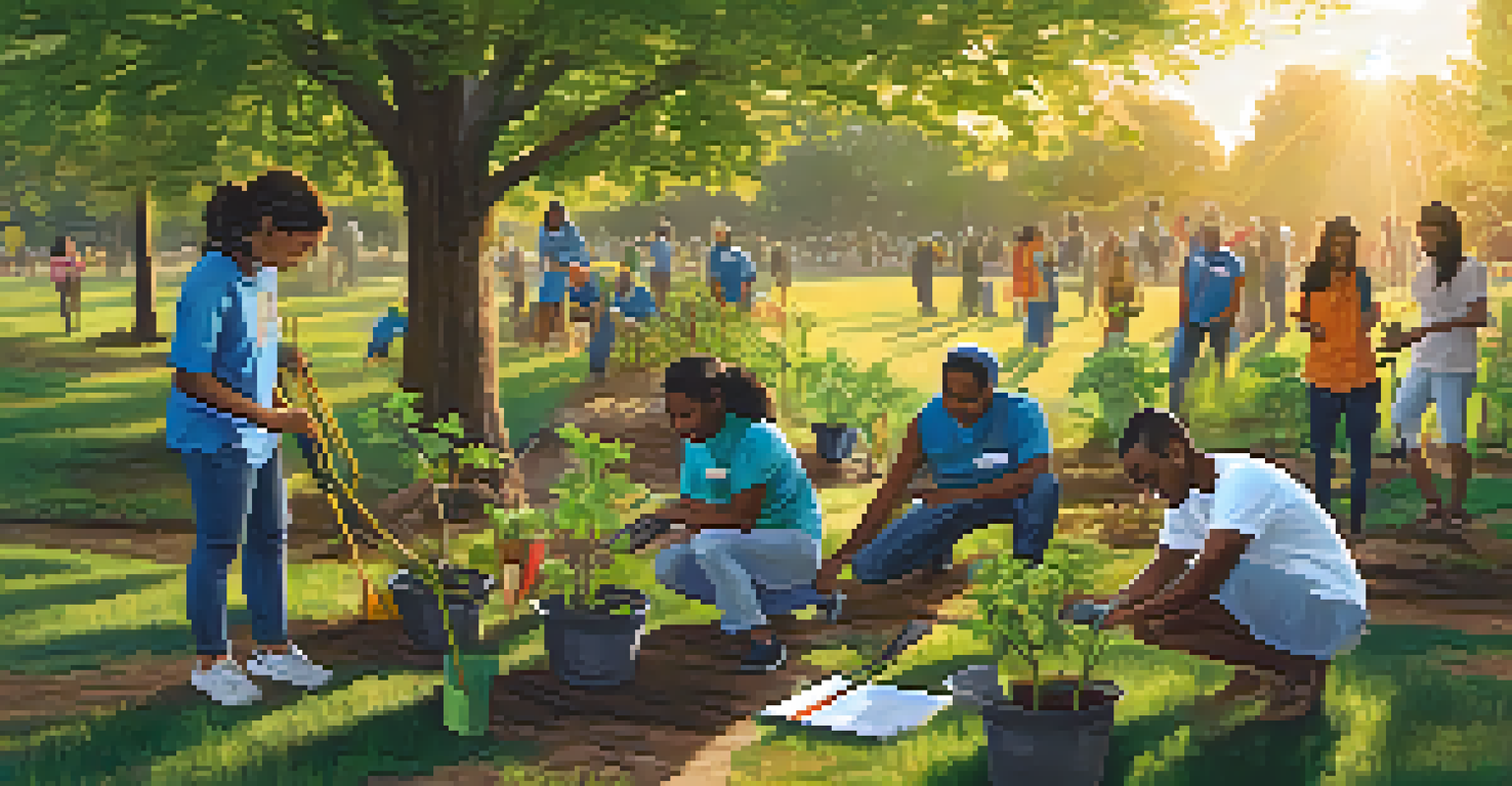The Impact of Interfaith Dialogue on Social Cohesion

Understanding Interfaith Dialogue and Its Purpose
Interfaith dialogue is a conversation between individuals from different religious backgrounds. Its primary goal is to promote understanding and respect among diverse faiths. By sharing beliefs and practices, participants can break down stereotypes and misconceptions that often lead to conflict.
The only way to make sense out of change is to plunge into it, move with it, and join the dance.
This dialogue can take many forms, from formal discussions to informal gatherings. It encourages open communication and a willingness to listen, fostering a sense of community among participants. Ultimately, interfaith dialogue aims to build bridges between faiths and create a more harmonious society.
As individuals engage in these discussions, they often discover shared values and common ground. This realization can lead to increased empathy and a greater appreciation for the richness of diverse cultures and traditions, laying the foundation for lasting social cohesion.
The Role of Interfaith Dialogue in Promoting Tolerance
At its core, interfaith dialogue promotes tolerance by encouraging individuals to engage with beliefs different from their own. This exposure helps to dismantle biases and fosters a culture of acceptance. When people understand the motivations and values behind various faiths, they are less likely to react with hostility or fear.

For instance, communities that host interfaith events often report a decrease in prejudice and discrimination. Participants learn to appreciate the beauty in each other's traditions, creating a sense of unity rather than division. This shift in perspective is crucial in today’s increasingly polarized world.
Tolerance Builds Stronger Communities
Engaging in interfaith discussions helps dismantle biases and promotes a culture of acceptance.
Moreover, as tolerance grows within communities, so does the potential for collaborative efforts. Diverse groups can come together to address social issues, demonstrating the power of collective action rooted in mutual respect and understanding.
Building Community Through Shared Experiences
Interfaith dialogue often involves shared experiences, such as community service or cultural celebrations. These activities help individuals bond over common goals, fostering a sense of belonging and camaraderie. When people work together, they build relationships that transcend religious boundaries.
Diversity is the one true thing we all have in common. Celebrate it every day.
For example, a community that organizes interfaith volunteer days allows participants to see each other in a new light. As they unite for a cause, they find commonality in their humanity, which can lead to lasting friendships. This sense of community strengthens local ties and contributes to overall social cohesion.
Additionally, shared experiences can help break down barriers and challenge stereotypes. When individuals interact outside their usual religious contexts, they often find that their differences are outweighed by their similarities, reinforcing the message that unity is possible.
The Educational Benefits of Interfaith Dialogue
Interfaith dialogue serves as an educational platform, providing insights into various faith traditions. Participants gain knowledge about the beliefs, practices, and values of others, which can dispel myths and promote understanding. Education plays a vital role in shaping perceptions and attitudes toward different cultures.
For instance, workshops and seminars dedicated to interfaith topics can enrich participants' worldviews. They learn not only about others but also reflect on their own beliefs and values. This self-exploration can lead to personal growth and a more profound respect for diversity.
Shared Experiences Foster Unity
Community activities in interfaith settings strengthen relationships and highlight common humanity.
Moreover, when interfaith dialogue is integrated into educational institutions, it can have a transformative effect on younger generations. Teaching children about different faiths and encouraging them to engage with peers from diverse backgrounds can cultivate a culture of inclusivity from an early age.
Challenges Faced in Interfaith Dialogue Initiatives
Despite its potential, interfaith dialogue often faces challenges that can hinder its effectiveness. One significant barrier is the ingrained prejudices or misconceptions that participants may bring to the table. Overcoming these biases requires patience, empathy, and a commitment to open-mindedness.
Another challenge is the fear of confrontation or conflict, which can make individuals hesitant to engage in dialogue. Many people worry about offending others or misrepresenting their own beliefs. Creating a safe and respectful environment is essential for encouraging honest conversations.
Additionally, logistical issues, such as scheduling conflicts or funding, can impede the organization of interfaith events. Addressing these challenges requires collaboration and dedication from community leaders and participants alike, emphasizing the importance of persistence in building social cohesion.
The Influence of Technology on Interfaith Dialogue
In today's digital age, technology plays a crucial role in facilitating interfaith dialogue. Social media platforms and online forums allow individuals from diverse backgrounds to connect and share their perspectives. This accessibility can broaden the reach of interfaith initiatives beyond local communities.
Virtual events, webinars, and online discussions have become increasingly popular, enabling participants from different parts of the world to engage in meaningful conversations. This global perspective can enrich the dialogue and foster a sense of shared humanity, as people recognize that challenges and aspirations are often universal.
Promoting Understanding Through Dialogue
Interfaith dialogue aims to foster understanding and respect among diverse religious backgrounds.
However, while technology offers new opportunities, it also presents challenges, such as the spread of misinformation. Participants must be vigilant and critical of the sources they engage with to ensure that their dialogue remains constructive and respectful.
The Future of Interfaith Dialogue and Social Cohesion
As society continues to evolve, the importance of interfaith dialogue in fostering social cohesion cannot be overstated. Looking ahead, these initiatives will need to adapt to the changing landscape, incorporating new methods and technologies to engage diverse communities. The potential for positive change is immense if we commit to this cause.
Furthermore, collaboration between religious leaders, community organizations, and educational institutions can amplify the impact of interfaith dialogue. By working together, they can create more inclusive spaces that encourage dialogue and understanding across faiths.

Ultimately, the future of interfaith dialogue hinges on our collective willingness to embrace diversity and foster connections. By investing in these conversations, we can build a more cohesive society where acceptance and understanding thrive.